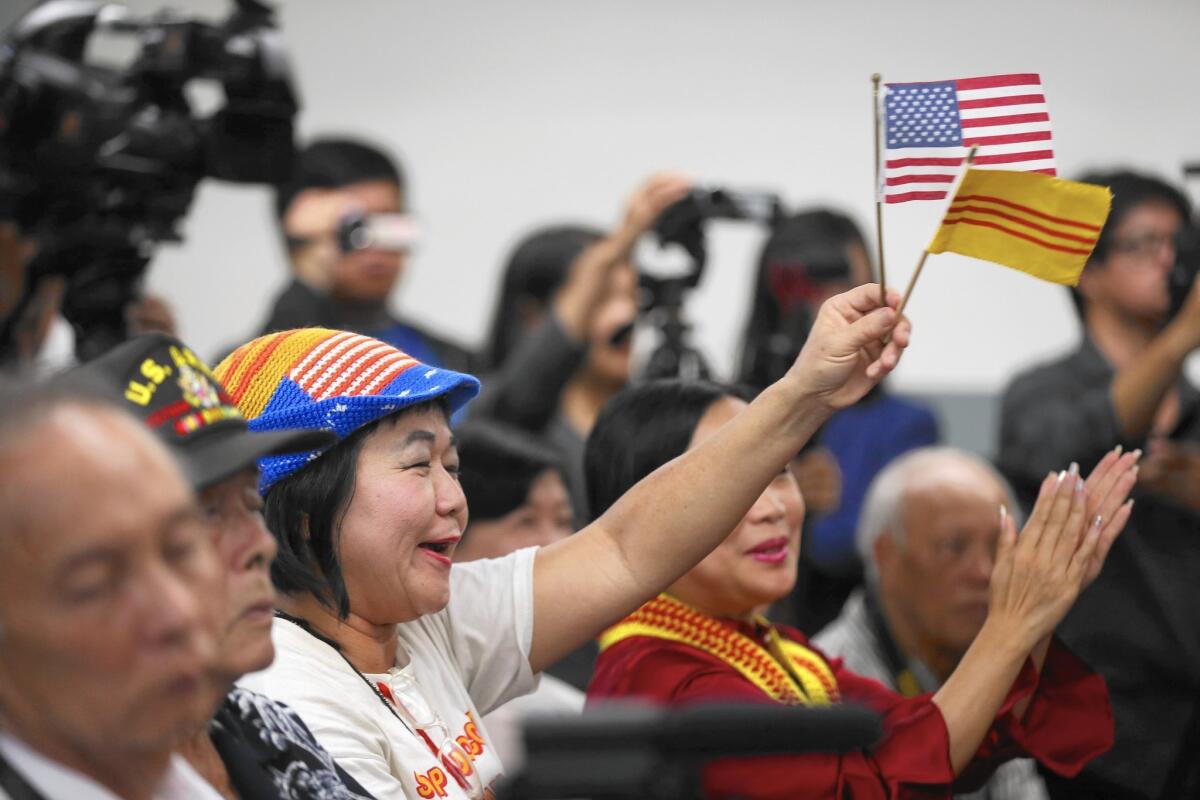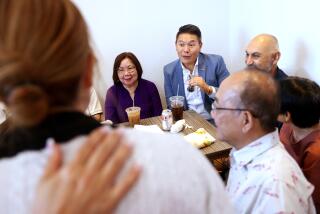Emigre community eyes improving U.S.-Vietnam ties with suspicion

Victoria Kim waves the flags of the U.S. and the former South Vietnam during a town hall meeting with the U.S. ambassador to Vietnam, Ted Osius, at Coastline Community College in Little Saigon.
- Share via
As President Obama closes out his presidency, one of his goals has been to strengthen relations with Vietnam.
He welcomed Nguyen Phu Trong, the general secretary of Vietnam’s Communist Party, to the Oval Office last week, and the landmark Trans-Pacific Partnership agreement is expected to boost trade between the two countries.
But these moves alarm the Vietnamese emigre community in Little Saigon and elsewhere, who burn with distrust of Vietnam’s communist government and complain that the U.S. isn’t doing enough to deal with human rights abuses in their homeland.
Against this tense backdrop, the U.S. ambassador to Vietnam came to Westminster on Sunday, speaking to Vietnamese Americans about their concerns.
Ambassador Ted Osius said he was optimistic about stronger ties between the two countries. But he warned that much work remains. He said he balances his audience’s demands for advancement in human rights in Vietnam with the Obama administration’s increasing desire to do business with the communist country and former enemy.
“If we don’t engage,” he said, “we don’t have a say.”
This was Osius’ first public speech in Orange County, home to the largest Vietnamese population outside Vietnam. He bonded with his audience in their native language.
“Vietnam wants two things from us — prosperity and security,” Osius told the more than 350 people crammed inside the Le-Jao Center at Coastline Community College. “That makes this an extraordinary time where we have extraordinary leverage.”
Those who attended the address said they understand the different views of how best to bring change to Vietnam.
“That’s the dilemma,” said Hoa Truong, a Fountain Valley resident who carried a rosary. “On one side, we don’t want to have anything to do with the Hanoi government that the ambassador’s boss is connecting with. Yet we pray for that same government to understand the mistakes they are making each day by not granting our people the freedom they deserve.”
The ambassador was flanked by Reps. Alan Lowenthal (D-Long Beach), Ed Royce (R-Fullerton), Loretta Sanchez (D-Santa Ana) and Dana Rohrabacher (R-Huntington Beach), whose districts include parts of the Vietnamese American community. Sanchez, who is running for the Democratic nomination for the U.S. Senate, wrote a letter opposing Obama’s meeting with the Vietnamese leader.
Royce said that the Vietnamese government treats people “like animals,” putting them in cells with hardened criminals and encouraging those criminals to beat dissenters. He cited information from Human Rights Watch.
Yet he also noted that international polls conducted last month showed 92% of those surveyed in Vietnam “want a closer relationship with the U.S.,” which means that “we must structure trade agreements in a way that empowers the people.”
Osius agreed: “I would ask: ‘Do you want to continue to integrate in the world community? Or do you want to put more bloggers in prison?’”
But Osius emphasized that he feels “great hope,” with trade between the U.S. and Vietnam expected to climb to $40 billion next year, and with student exchange reaching 17,000 people this year.
Osius said that he is involved in talks on the much-debated Trans-Pacific Partnership, but that Congress will ultimately decide whether the Southeast Asian country can participate in the pact, which would lower trade barriers such as tariffs while enforcing standards for labor and environmental laws.
After the town hall, some in the audience said they were impressed by the ambassador, even if they didn’t always support his message.
“He was humble when he needed to be. He was strong,” said Khoa Pham, an Irvine resident. “I appreciate his direct answers and how he’s willing to invest personal energy in bringing common sense to this horrible regime that many in my family still live under.”
“He is more optimistic than we are because he hasn’t been jailed or harmed,” Truong said. “We are older and slower to change our beliefs. But he is right when he tells that government it doesn’t threaten you to let people worship as they wish.”
Garden Grove Mayor Bao Nguyen, who is gay, thanked Osius for his influence as an openly gay ambassador in Hanoi.
He called Osius’ work “crucial because young people in the U.S. and young people in Vietnam want to see each other succeed. What’s missing is that Vietnam’s leaders must recognize the trauma and suffering Vietnamese Americans and the Vietnamese people have endured.”
“But that doesn’t mean we take the extreme position of all or nothing in negotiating,” he added. “If you don’t think you can change, or you can’t heal, there’s no point in being at the table.”
Twitter: @newsterrier
More to Read
Sign up for Essential California
The most important California stories and recommendations in your inbox every morning.
You may occasionally receive promotional content from the Los Angeles Times.











